Wimbledon, Great Britain
June 26-July 9, 2000; 128 Draw (16 seeds); Surface – Grass
Pete Sampras captured his seventh Wimbledon crown in eight years. It was his toughest triumph at All-England Club (he was struggling with foot injury in the first week, and at some stages of his 2R & 3R matches, his loss seemed possible), and the most emotional one – for the first time his final match on the tour witnessed by his parents because the occasion was special – Sampras broke an unbeaten since 1967 record of Roy Emerson of the most Grand Slam titles. Mark Philippoussis and Sjeng Schalken established a new record for the most games played in the fifth set (38) – it will remain record just three years. Vince Spadea snapped an Open era longest streak of defeats, stunning one of the tournament favorites! 22-year-old Vladimir Voltchkov, actually without any experience at the main-level, became the first qualifier to reach the Wimbly semifinals since John McEnroe in 1977!
All scorelines
First round: Lisa Dilman
Whether it’s more than a fleeting moment, of course, will be determined later this fortnight. Still, the biggest upset so far at Wimbledon came Tuesday from 23-year-old Jan-Michael Gambill, ranked 56th, who took out seventh-seeded Lleyton Hewitt of Australia, 6-3, 6-2, 7-5, using a blend of power and poise. Hewitt, viewed by local odds-makers as the second favorite behind six-time champion Sampras, was unusually flat. His forehand deserted him the first two sets, and by the third, his backhand was slamming into the middle of the net. He found some form in the 3rd set, racing to a 5:2* lead and making the American look flat-footed. But Gambill never gave up. He 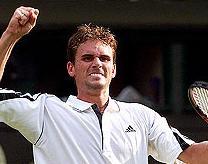 saved three set points in the 8th game and clawed his way back to level the set at 5-all. “The next step is to make it through to the Thursday, Friday, Saturday and Sunday, the second week in the slams,” said Hewitt, who has won four titles in 2000, including a Queen’s Club championship recently against Sampras in the final. Said Gambill: “It’s about time I really come out and continue to play well. I need to come out and play a lot more matches like this.” Another promising youngster, 19-year-old Taylor Dent of Newport Beach, pressed second-seeded Andre Agassi for a set and a half before retiring in the 4th set because of an injured right knee. Dent, a qualifier ranked 256th and making his Wimbledon debut, received treatment for the knee when he was trailing, 0:5, in the 3rd set. Agassi was leading, 2-6, 6-3, 6-0, 4-0, when Dent defaulted. Tournament officials said he may have a torn patella tendon. Dent impressed Agassi. “I made him play to hold serve every game,” he said. “He was hitting some good, deep volleys and not even letting me get a good look at a pass. I felt very good about the way I started. I just had to stay with it, keep making him play and eventually he would start breaking down on his volleys.” Carlos Moya is ahead of some of his Spanish comrades – he has actually won three matches at Wimbledon. Win No. 4 will have to wait, as he lost to Rainer Schuttler of Germany, 6-3, 6-7(5), 6-3, 6-2. The struggling Moya said he supported Alex Corretja and Albert Costa in their boycott of Wimbledon and then took a shot at Sampras, who called the move “childish.” Said Moya: “Maybe they should do it the same as the French Open. Some of the players who are seeded here, they should play [qualifying] there. Maybe in Santander [at Davis Cup], they can shut their mouth.” French Open champion Gustavo Kuerten moved into the second round of Wimbledon on Tuesday, beating American Chris Woodruff 6-4, 6-7(5), 7-5, 7-6(5) with a flurry of aces. Kuerten served out the victory with his 29th ace. The fourth-seeded Brazilian reached the quarterfinals on grass last year before losing to Agassi. Kuerten lost the 2nd set but probably should have won it as he showed his is more than just a clay-court
saved three set points in the 8th game and clawed his way back to level the set at 5-all. “The next step is to make it through to the Thursday, Friday, Saturday and Sunday, the second week in the slams,” said Hewitt, who has won four titles in 2000, including a Queen’s Club championship recently against Sampras in the final. Said Gambill: “It’s about time I really come out and continue to play well. I need to come out and play a lot more matches like this.” Another promising youngster, 19-year-old Taylor Dent of Newport Beach, pressed second-seeded Andre Agassi for a set and a half before retiring in the 4th set because of an injured right knee. Dent, a qualifier ranked 256th and making his Wimbledon debut, received treatment for the knee when he was trailing, 0:5, in the 3rd set. Agassi was leading, 2-6, 6-3, 6-0, 4-0, when Dent defaulted. Tournament officials said he may have a torn patella tendon. Dent impressed Agassi. “I made him play to hold serve every game,” he said. “He was hitting some good, deep volleys and not even letting me get a good look at a pass. I felt very good about the way I started. I just had to stay with it, keep making him play and eventually he would start breaking down on his volleys.” Carlos Moya is ahead of some of his Spanish comrades – he has actually won three matches at Wimbledon. Win No. 4 will have to wait, as he lost to Rainer Schuttler of Germany, 6-3, 6-7(5), 6-3, 6-2. The struggling Moya said he supported Alex Corretja and Albert Costa in their boycott of Wimbledon and then took a shot at Sampras, who called the move “childish.” Said Moya: “Maybe they should do it the same as the French Open. Some of the players who are seeded here, they should play [qualifying] there. Maybe in Santander [at Davis Cup], they can shut their mouth.” French Open champion Gustavo Kuerten moved into the second round of Wimbledon on Tuesday, beating American Chris Woodruff 6-4, 6-7(5), 7-5, 7-6(5) with a flurry of aces. Kuerten served out the victory with his 29th ace. The fourth-seeded Brazilian reached the quarterfinals on grass last year before losing to Agassi. Kuerten lost the 2nd set but probably should have won it as he showed his is more than just a clay-court 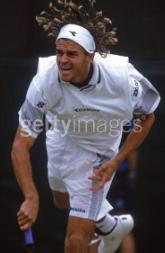 player. The Brazilian broke to lead 4:2 in the set and was serving at 5:4 but was broken when a ball that appeared to be two or three inches long was called in and made it 5-all. The upset Brazilian went on to lose the set. After falling behind 6:5, he stomped off the court at the changeover, slammed his racket to the ground, and argued furiously with Portuguese umpire Jorge Dias. The victory was Kuerten’s first over Woodruff – they are 1-1 – and gave him an impressive victory over an established grass-court player. The win was Kuerten’s 14th straight, a career-record for the Brazilian who has won 18 of his last 19 matches. He is trying to become the first player since Bjorn Borg to win the French Open and Wimbledon back-to-back. An injury decided another key match, with French Open runner-up Magnus Norman easing into the second round when Australia’s Mark Woodforde quit in the third set. The third-seeded Swede was leading 6-4, 6-2, 2-0 when Woodforde [191] retired with a back injury. The 35-year-old Woodforde never played a singles tournament afterwards, but was successful in doubles to the end of the season. It was Norman’s first match since losing in four sets to Kuerten in the French Open final earlier this month. Despite his high seeding, the Swede has never advanced past the third round at Wimbledon. Fifth-seeded Yevgeny Kafelnikov, a first-round loser twice in the past four years, advanced by beating Switzerland’s Roger Federer 7-5, 7-5, 7-6(6). The Swiss teenager led 5:4* in every set, he squandered a set point in the 2nd set. Australia’s Patrick Rafter, a semifinalist last year and seeded No. 12, beat Britain’s Jamie Delgado in straight sets, 6-3, 7-6(7), 6-1. Michael Chang, who has lost in the first round here four times, swept to a 6-2, 6-3, 6-2 win over Argentina’s Gaston Gaudio. Pete Sampras enjoyed a gentle work-out on Centre Court to start the defense of his Wimbledon title, beating the Czech Republic’s Jiri Vanek 6-4, 6-4, 6-2 on Monday. The six-time champion, bidding to win a record 13th Grand Slam title, broke the 22-year-old Wimbledon debutant’s serve in the 1st game of the1st set and never looked back. “It’s always nice to be back on that court. It’s comfortable surroundings for me – a comfortable court that I obviously over the years have grown to love,” Sampras said. Vince Spadea [61] shook off the label of the biggest loser in tennis on Monday by dumping 14th seed Greg Rusedski [22] out of Wimbledon in the first round. Spadea, who had lost a record 21 consecutive matches on the ATP Tour before Wimbledon, won an epic lasting nearly four hours 6-3, 6-7(5), 6-3, 6-7(8), 9-7. “We were like gladiators out there,” said Spadea after the match which, with a rain interruption of 1 hour 45 minutes, took up most of the opening day’s business on court one. The 25-year-old American, who last won a match in Lyon in October ’99, said it was a relief to succeed again, especially after wasting four match points: “If I had lost this match I was thinking ‘Holy goodness! I am going to have to stay in Europe until I win a match. But here I am, six months on. It was worth the wait.” Spadea, who has been working on his game with 1987 Wimbledon champion Pat Cash, said his heart sank when he saw he was drawn against Briton Rusedski, whose big serve is suited to the fast grass courts at Wimbledon. “My parents left and went home two days ago. I think they saw the draw and thought ‘Vince, man…'” he smiled. But Spadea was determined to do well. “Hey man, you have just got to go out and do it,” he said. “I am not scared of anyone.” Spadea showed great courage on Monday, holding his nerve after Rusedski
player. The Brazilian broke to lead 4:2 in the set and was serving at 5:4 but was broken when a ball that appeared to be two or three inches long was called in and made it 5-all. The upset Brazilian went on to lose the set. After falling behind 6:5, he stomped off the court at the changeover, slammed his racket to the ground, and argued furiously with Portuguese umpire Jorge Dias. The victory was Kuerten’s first over Woodruff – they are 1-1 – and gave him an impressive victory over an established grass-court player. The win was Kuerten’s 14th straight, a career-record for the Brazilian who has won 18 of his last 19 matches. He is trying to become the first player since Bjorn Borg to win the French Open and Wimbledon back-to-back. An injury decided another key match, with French Open runner-up Magnus Norman easing into the second round when Australia’s Mark Woodforde quit in the third set. The third-seeded Swede was leading 6-4, 6-2, 2-0 when Woodforde [191] retired with a back injury. The 35-year-old Woodforde never played a singles tournament afterwards, but was successful in doubles to the end of the season. It was Norman’s first match since losing in four sets to Kuerten in the French Open final earlier this month. Despite his high seeding, the Swede has never advanced past the third round at Wimbledon. Fifth-seeded Yevgeny Kafelnikov, a first-round loser twice in the past four years, advanced by beating Switzerland’s Roger Federer 7-5, 7-5, 7-6(6). The Swiss teenager led 5:4* in every set, he squandered a set point in the 2nd set. Australia’s Patrick Rafter, a semifinalist last year and seeded No. 12, beat Britain’s Jamie Delgado in straight sets, 6-3, 7-6(7), 6-1. Michael Chang, who has lost in the first round here four times, swept to a 6-2, 6-3, 6-2 win over Argentina’s Gaston Gaudio. Pete Sampras enjoyed a gentle work-out on Centre Court to start the defense of his Wimbledon title, beating the Czech Republic’s Jiri Vanek 6-4, 6-4, 6-2 on Monday. The six-time champion, bidding to win a record 13th Grand Slam title, broke the 22-year-old Wimbledon debutant’s serve in the 1st game of the1st set and never looked back. “It’s always nice to be back on that court. It’s comfortable surroundings for me – a comfortable court that I obviously over the years have grown to love,” Sampras said. Vince Spadea [61] shook off the label of the biggest loser in tennis on Monday by dumping 14th seed Greg Rusedski [22] out of Wimbledon in the first round. Spadea, who had lost a record 21 consecutive matches on the ATP Tour before Wimbledon, won an epic lasting nearly four hours 6-3, 6-7(5), 6-3, 6-7(8), 9-7. “We were like gladiators out there,” said Spadea after the match which, with a rain interruption of 1 hour 45 minutes, took up most of the opening day’s business on court one. The 25-year-old American, who last won a match in Lyon in October ’99, said it was a relief to succeed again, especially after wasting four match points: “If I had lost this match I was thinking ‘Holy goodness! I am going to have to stay in Europe until I win a match. But here I am, six months on. It was worth the wait.” Spadea, who has been working on his game with 1987 Wimbledon champion Pat Cash, said his heart sank when he saw he was drawn against Briton Rusedski, whose big serve is suited to the fast grass courts at Wimbledon. “My parents left and went home two days ago. I think they saw the draw and thought ‘Vince, man…'” he smiled. But Spadea was determined to do well. “Hey man, you have just got to go out and do it,” he said. “I am not scared of anyone.” Spadea showed great courage on Monday, holding his nerve after Rusedski 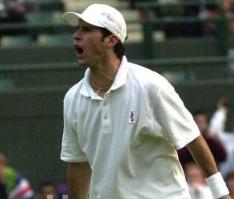 had saved two match points in the 4th set to take the match into a decider. Spadea had made a storming start before the rain break – helped by a string of double faults from the Briton – and he broke Rusedski on his fourth breakpoint to go 3:1 up in the 5th. Rusedski, still suffering the effects of a foot injury which put him out of action for the first two months of the year, broke back and saved another match point to hold for 5-all and broke to go 7:6 up. But as the light faded Spadea seized on mistakes by his opponent to break for 7:7 and held to take the lead again. The Canadian-born Rusedski saved the first of two more match points in the 16th game but succumbed on the second and Spadea’s nightmare finally ended. Rusedski was devastated, saying he planned to go “as far away as possible from Wimbledon” for the remainder of the fortnight. But he paid tribute to Spadea. “He is too good a player to have lost as many matches as he lost in a row,” said Rusedski. Spadea, in turn, had words of praise for Cash. “He has been very generous and it has been an amazing experience to work with someone of his playing stature.” Cash had helped him improve his grasscourt game, he said. “I have got a lot of character. Now if I can get my game up there we are going to have a big thing going here.”
had saved two match points in the 4th set to take the match into a decider. Spadea had made a storming start before the rain break – helped by a string of double faults from the Briton – and he broke Rusedski on his fourth breakpoint to go 3:1 up in the 5th. Rusedski, still suffering the effects of a foot injury which put him out of action for the first two months of the year, broke back and saved another match point to hold for 5-all and broke to go 7:6 up. But as the light faded Spadea seized on mistakes by his opponent to break for 7:7 and held to take the lead again. The Canadian-born Rusedski saved the first of two more match points in the 16th game but succumbed on the second and Spadea’s nightmare finally ended. Rusedski was devastated, saying he planned to go “as far away as possible from Wimbledon” for the remainder of the fortnight. But he paid tribute to Spadea. “He is too good a player to have lost as many matches as he lost in a row,” said Rusedski. Spadea, in turn, had words of praise for Cash. “He has been very generous and it has been an amazing experience to work with someone of his playing stature.” Cash had helped him improve his grasscourt game, he said. “I have got a lot of character. Now if I can get my game up there we are going to have a big thing going here.”
Second round: Bill Glauber, John Parsons
 Five seeded players were beaten, two top seeded Americans (Sampras & Agassi) barely survived! Five qualifiers reached the third round, the most since 1992.
Five seeded players were beaten, two top seeded Americans (Sampras & Agassi) barely survived! Five qualifiers reached the third round, the most since 1992.
Left ankle wrapped in tape, shoulders slumped in despair, Pete Sampras was struggling to hold on to Wimbledon yesterday. The six-time champion sought to shake off apparent pain and a bad case of the Karol Kucera blues. Everywhere Sampras looked on Centre Court in the gathering darkness, there was Kucera, refusing to go away quietly. Sampras eventually launched one last big serve to survive and win, 7-6(9), 3-6, 6-3, 6-4. But at what cost? That was the question that loomed over Wimbledon as Sampras left the grounds for treatment of an inflamed left foot. He underwent an MRI and his condition was to be re-evaluated early today, according to tournament officials. Sampras, whose left foot and ankle were taped by a trainer at 5:2* in the 3rd set, declined to make any comment. It was a troubling finish to a weird day, as Wimbledon descended into the Twilight Zone. Sampras saved a couple of set points in the 1st set tie-break; the wilting American saved also two break points at 2:3 in the 4th set when it seemed he would have lost the match if Kucera had managed to prolong to the decider. Sampras had similarly tough battle against Kucera on the same court four years earlier when the Slovak was relatively unknown. The top half of the men’s draw was laid to waste, with only two surviving seeds, No. 1 Sampras and No. 9 Thomas Enqvist, who defeated Francisco Clavet, 7-6(2), 7-6(6), 7-5. The normally mild-mannered Wayne Ferreira lost his cool and snapped his racket but kayoed 1996 champion and No. 11 seed Richard Krajicek, 5-7, 6-3, 6-3, 7-6(3). Serving at a set point down, 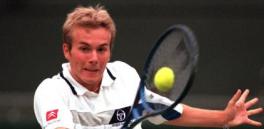 Ferreira was flustered in the opening set after chair umpire Kim Craven overruled a line judge and called his serve out. After losing the point – and set – Ferreira tossed his racket, and then broke it in half against a chair. “It kind of scared me a little bit more than anything else because I had no intentions of doing that,” Ferreira said. There were two shocking defeats of seeded players (Magnus Norman & Cedric Pioline), who lost to unknown qualifiers. Norman, the French Open finalist and No. 3 seed, fell to a 5’5 Belgian named Olivier Rochus, 6-4, 2-6, 6-4, 6-7(4), 6-1. Things got so bad for Norman in the last set, he handed his racket to a ball girl and let her rally with Rochus [179]. “I was playing so poorly, so, I thought, ‘Hey, she’s going to do better than me.’ She actually did,” Norman said. Former Wimbledon finalist, Pioline [6] was beaten by a 1996 Wimbledon junior champion – Vladimir Voltchkov [237]. The Belorussian won 6-3, 6-3, 2-6, 3-6, 6-4. Russia’s Yevgeny Kafelnikov, the number five seed, was knocked out of Wimbledon on Thursday 6-1, 7-6(0), 6-4 by Sweden’s Thomas Johansson as the massacre of the men’s seeds continued in the second round. Kafelnikov, who called the trainer in the 2nd set to massage his right shoulder, never really got into the match against Johansson, who had lost 10 times in the first round of tournaments this year. The 1st set was a 22-minute nightmare for Kafelnikov, winner of the French and Australian Opens, who was made to look flat-footed and one-paced. He salvaged his serve just once against the rampaging Swede. Johansson raced to a *5:2 lead in the second set of a one-sided contest until Kafelnikov suddenly found his form for the first time to claw back to 5:5. He lost his serve with a string of double faults and called in the trainer for three minutes of treatment. Then, broke back for the third time in the set, but double-faulting twice when it looked painful to raise his shoulder, Kafelnikov lost the tie-break at ‘love’. In the 3rd set, the pair level-pegged all the way to the last game when the
Ferreira was flustered in the opening set after chair umpire Kim Craven overruled a line judge and called his serve out. After losing the point – and set – Ferreira tossed his racket, and then broke it in half against a chair. “It kind of scared me a little bit more than anything else because I had no intentions of doing that,” Ferreira said. There were two shocking defeats of seeded players (Magnus Norman & Cedric Pioline), who lost to unknown qualifiers. Norman, the French Open finalist and No. 3 seed, fell to a 5’5 Belgian named Olivier Rochus, 6-4, 2-6, 6-4, 6-7(4), 6-1. Things got so bad for Norman in the last set, he handed his racket to a ball girl and let her rally with Rochus [179]. “I was playing so poorly, so, I thought, ‘Hey, she’s going to do better than me.’ She actually did,” Norman said. Former Wimbledon finalist, Pioline [6] was beaten by a 1996 Wimbledon junior champion – Vladimir Voltchkov [237]. The Belorussian won 6-3, 6-3, 2-6, 3-6, 6-4. Russia’s Yevgeny Kafelnikov, the number five seed, was knocked out of Wimbledon on Thursday 6-1, 7-6(0), 6-4 by Sweden’s Thomas Johansson as the massacre of the men’s seeds continued in the second round. Kafelnikov, who called the trainer in the 2nd set to massage his right shoulder, never really got into the match against Johansson, who had lost 10 times in the first round of tournaments this year. The 1st set was a 22-minute nightmare for Kafelnikov, winner of the French and Australian Opens, who was made to look flat-footed and one-paced. He salvaged his serve just once against the rampaging Swede. Johansson raced to a *5:2 lead in the second set of a one-sided contest until Kafelnikov suddenly found his form for the first time to claw back to 5:5. He lost his serve with a string of double faults and called in the trainer for three minutes of treatment. Then, broke back for the third time in the set, but double-faulting twice when it looked painful to raise his shoulder, Kafelnikov lost the tie-break at ‘love’. In the 3rd set, the pair level-pegged all the way to the last game when the 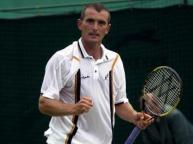 lackluster Kafelnikov, who was serving, crumbled in a contest he had never looked like winning. Kafelnikov’s compatriot Marat Safin joined the growing ranks of ousted seeds on Thursday when he lost his second round Wimbledon match to Czech Martin Damm 7-5, 7-6(4), 6-3. The 15th seed looked to be on a winning streak in the opening games, but Damm found his rhythm and spun stunning returns past the tall Russian to break his serve and take the 1st set. The Czech’s powerful serve went off the boil at the start of the 2nd set but Safin seemed reluctant to punish slower balls, instead hitting a series of poor returns which floated out of play. He failed to regain his concentration and quickly lost his temper, incurring a warning for ball abuse and flirting with another after smashing his raquet on the court. After losing to fellow Stanford alum Paul Goldstein, 3-6, 6-2, 5-7, 6-2, 12-10, Jeff Tarango refused to shake hands with his rival. Tarango was booed off the court, a rare Wimbledon occurrence. Tarango said he was upset that late in the match he was forced to hold off serving because Goldstein called for a trainer on two occasions. “Of course, he was faking the injury,” Tarango said. “Gamesmanship or not, I just thought it was bush league. I didn’t think it was cool. He played a good match, but he’s got to earn my respect in different ways.” Goldstein, a resident of Rockville, said: “The last thing on my mind is trying to do anything in any way unethical or unsportsmanlike.” He said he was “startled” when Tarango refused to shake his hand. “To have that kind of… anger burns me out a little,” he said. “I certainly would have preferred it if we would have shook hands and said, ‘Gee, that was a battle. Let’s have a beer tonight, it’s on me.'” Todd Martin made no bones about it. It was 1996 all over again as his self-belief agonizingly deserted him while he was holding a winning lead on the Centre Court and he allowed Andre Agassi to remain a prime challenger for the men’s singles title. Four years ago Martin, now 29, stood one game away from a place in the final, leading fellow American MaliVai Washington *5:1 in the final set of their rain-delayed semi-final, and lost 10-8 in the fifth. This time he held a 5:2 double-break advantage in the final set of a second-round clash interrupted overnight by the weather, but he was to be punished for a sudden bout of errors 37 minutes after
lackluster Kafelnikov, who was serving, crumbled in a contest he had never looked like winning. Kafelnikov’s compatriot Marat Safin joined the growing ranks of ousted seeds on Thursday when he lost his second round Wimbledon match to Czech Martin Damm 7-5, 7-6(4), 6-3. The 15th seed looked to be on a winning streak in the opening games, but Damm found his rhythm and spun stunning returns past the tall Russian to break his serve and take the 1st set. The Czech’s powerful serve went off the boil at the start of the 2nd set but Safin seemed reluctant to punish slower balls, instead hitting a series of poor returns which floated out of play. He failed to regain his concentration and quickly lost his temper, incurring a warning for ball abuse and flirting with another after smashing his raquet on the court. After losing to fellow Stanford alum Paul Goldstein, 3-6, 6-2, 5-7, 6-2, 12-10, Jeff Tarango refused to shake hands with his rival. Tarango was booed off the court, a rare Wimbledon occurrence. Tarango said he was upset that late in the match he was forced to hold off serving because Goldstein called for a trainer on two occasions. “Of course, he was faking the injury,” Tarango said. “Gamesmanship or not, I just thought it was bush league. I didn’t think it was cool. He played a good match, but he’s got to earn my respect in different ways.” Goldstein, a resident of Rockville, said: “The last thing on my mind is trying to do anything in any way unethical or unsportsmanlike.” He said he was “startled” when Tarango refused to shake his hand. “To have that kind of… anger burns me out a little,” he said. “I certainly would have preferred it if we would have shook hands and said, ‘Gee, that was a battle. Let’s have a beer tonight, it’s on me.'” Todd Martin made no bones about it. It was 1996 all over again as his self-belief agonizingly deserted him while he was holding a winning lead on the Centre Court and he allowed Andre Agassi to remain a prime challenger for the men’s singles title. Four years ago Martin, now 29, stood one game away from a place in the final, leading fellow American MaliVai Washington *5:1 in the final set of their rain-delayed semi-final, and lost 10-8 in the fifth. This time he held a 5:2 double-break advantage in the final set of a second-round clash interrupted overnight by the weather, but he was to be punished for a sudden bout of errors 37 minutes after 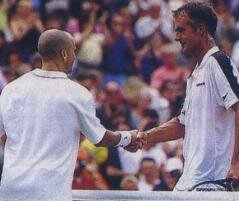 missing the first of his two match points. Once again defeat came in the 18th game of the fifth. Agassi, who must have been surprised, as well as relieved, to have survived 6-4, 2-6, 7-6(3), 2-6, 10-8, was being just as honest and frank as his disappointed opponent when he said: “You need a little help from 2:5 and I was very lucky to get back into the match. When I lost my serve a second time [in the final set], I didn’t think there was a lot of help left but I was determined to make him work to serve out for it.” Martin stated: “I really felt I’d got to the point where I was controlling play. I hit an ace on the first point at 5:2 but he hit a good return to make it 15/15 and before you know it, I’m between a rock and a hard place in that game. Once that happens, once one of those breaks goes, the other guy can’t help but feel a little bit of a boost. Also, it’s tough for the server to come back if he has to serve again and try and play a good game with those vivid memories.” He admitted that the Washington match came flooding back into his mind, saying that he felt he had almost stopped breathing and his feet stopped moving. “It was a little bit like that this time but to a much lesser extent and I don’t think the moment was as big as in ’96,” said the stoical American. “Frankly I was much more confident going into these last few games than in ’96, probably from having been there in ’96. It’s most important in our sport to focus point to point. All the time you’re asking yourself, ‘what’s the best way to win this point’. At 5:2, 30/30, I kept telling myself, ‘let’s be aggressive with it’. I did – but I didn’t make it. Sort of live by the risks, die by the risks.” When Agassi was serving at 3:5 (five ‘deuces’ in that game), Martin had two match points: on the first match point Agassi, who had been hitting a greater percentage of second serves than first deliveries, caught him off guard as the ball skidded through and he netted a backhand; the second came a few points later, amid a gasp of disbelief when Agassi double-faulted to provide the golden opportunity – yet a steadily revitalized Agassi gained the initiative as a rally unfolded and put away a sturdy backhand volley. It is always a good sign for Agassi when he jogs confidently to his chair at changeovers and by now this was happening. When Martin, who had hit 28 aces, double-faulted on the first point when serving at 8:9, one sensed the end was near – and so it proved. There were two other five-setters with squandered match points in fifth sets: Hicham Arazi defeated “lucky loser” Sebastien Lareau 6-3, 3-6, 6-7(6), 6-4, 9-7 saving three match points – the 5’9 Moroccan served 23 aces; in turn 6’7 German (British mother) Alexander Popp [114] playing his seventh main-level tournament, with help of just 8 aces, ousted [24] Michael Chang 7-6(5), 4-6, 6-7(3), 6-3, 8-6 in 3 hours 48 minutes, withstanding one match point.
missing the first of his two match points. Once again defeat came in the 18th game of the fifth. Agassi, who must have been surprised, as well as relieved, to have survived 6-4, 2-6, 7-6(3), 2-6, 10-8, was being just as honest and frank as his disappointed opponent when he said: “You need a little help from 2:5 and I was very lucky to get back into the match. When I lost my serve a second time [in the final set], I didn’t think there was a lot of help left but I was determined to make him work to serve out for it.” Martin stated: “I really felt I’d got to the point where I was controlling play. I hit an ace on the first point at 5:2 but he hit a good return to make it 15/15 and before you know it, I’m between a rock and a hard place in that game. Once that happens, once one of those breaks goes, the other guy can’t help but feel a little bit of a boost. Also, it’s tough for the server to come back if he has to serve again and try and play a good game with those vivid memories.” He admitted that the Washington match came flooding back into his mind, saying that he felt he had almost stopped breathing and his feet stopped moving. “It was a little bit like that this time but to a much lesser extent and I don’t think the moment was as big as in ’96,” said the stoical American. “Frankly I was much more confident going into these last few games than in ’96, probably from having been there in ’96. It’s most important in our sport to focus point to point. All the time you’re asking yourself, ‘what’s the best way to win this point’. At 5:2, 30/30, I kept telling myself, ‘let’s be aggressive with it’. I did – but I didn’t make it. Sort of live by the risks, die by the risks.” When Agassi was serving at 3:5 (five ‘deuces’ in that game), Martin had two match points: on the first match point Agassi, who had been hitting a greater percentage of second serves than first deliveries, caught him off guard as the ball skidded through and he netted a backhand; the second came a few points later, amid a gasp of disbelief when Agassi double-faulted to provide the golden opportunity – yet a steadily revitalized Agassi gained the initiative as a rally unfolded and put away a sturdy backhand volley. It is always a good sign for Agassi when he jogs confidently to his chair at changeovers and by now this was happening. When Martin, who had hit 28 aces, double-faulted on the first point when serving at 8:9, one sensed the end was near – and so it proved. There were two other five-setters with squandered match points in fifth sets: Hicham Arazi defeated “lucky loser” Sebastien Lareau 6-3, 3-6, 6-7(6), 6-4, 9-7 saving three match points – the 5’9 Moroccan served 23 aces; in turn 6’7 German (British mother) Alexander Popp [114] playing his seventh main-level tournament, with help of just 8 aces, ousted [24] Michael Chang 7-6(5), 4-6, 6-7(3), 6-3, 8-6 in 3 hours 48 minutes, withstanding one match point.
Third round: Bill Glauber
 Fourth seed Gustavo Kuerten‘s hopes of back-to-back French and Wimbledon triumphs ended on Saturday when German Alexander Popp crushed him 7-6(6), 6-2, 6-1 ending Kuerten’s 15-match winning streak. The Brazilian looked out of sorts on court two and was never in the game once he had received treatment to his left thigh and lower back during the 2nd set. “After the second set I thought I had a good chance because he seemed to be a bit injured. I had a good chance after that because it would be difficult for him to come back and win three straight sets,” said Popp (b. 1976), who was inspired to take up the game after watching Boris Becker win Wimbledon in 1985. Kuerten won only one more game after the trainer break at 2:3 in the second set. The 2,01 m Popp, ranked 114 in the world, used his big serve and long reach to down the French Open champion, but he also produced fine running groundstrokes down the lines. It was Popp’s greatest victory in only his second Grand Slam event, after playing mostly on the Challenger circuit. “This is probably the nicest day of my life,” said Popp, who also holds a British passport through his English mother. Wimbledon handed over its Centre Court of dreams to the greatest modern player of them all – Pete Sampras. With his boyhood heroes watching, left shin hurting and place in tennis history beckoning, Sampras beat Justin Gimelstob, 2-6, 6-4, 6-2, 6-2, yesterday. This wasn’t vintage Sampras, but it was good enough to pull him into the round of 16 and keep alive his hope of winning a seventh Wimbledon and 13th Grand Slam title. He was hurting yet playing, rusty one moment, electrifying the next. He hadn’t practiced since emerging from his second-round win over Kucera with tendinitis that spread from the top of his left foot to his shin. He skipped the parade of past champions brought together by Wimbledon to celebrate the “Millennium Championships.” And for a few moments, it looked like he should have skipped the match. “My racket felt like a foreign object,” Sampras said. His first serves were flying wildly – he served four double faults to lose his first service game and gave away the set with another double fault. Up in the royal box, the likes of Bjorn Borg and Rod Laver looked on. “At one point, I wanted to throw my racket up there – they could play for me,” he said. World number one Andre Agassi hurried to a 6-3, 6-3, 6-4 victory over Frenchman Jerome Golmard on Saturday to reach the last 16 at Wimbledon. After his two-day, five-set marathon against Martin in the second round, during which he saved two match points, the second-seeded American looked keen to finish
Fourth seed Gustavo Kuerten‘s hopes of back-to-back French and Wimbledon triumphs ended on Saturday when German Alexander Popp crushed him 7-6(6), 6-2, 6-1 ending Kuerten’s 15-match winning streak. The Brazilian looked out of sorts on court two and was never in the game once he had received treatment to his left thigh and lower back during the 2nd set. “After the second set I thought I had a good chance because he seemed to be a bit injured. I had a good chance after that because it would be difficult for him to come back and win three straight sets,” said Popp (b. 1976), who was inspired to take up the game after watching Boris Becker win Wimbledon in 1985. Kuerten won only one more game after the trainer break at 2:3 in the second set. The 2,01 m Popp, ranked 114 in the world, used his big serve and long reach to down the French Open champion, but he also produced fine running groundstrokes down the lines. It was Popp’s greatest victory in only his second Grand Slam event, after playing mostly on the Challenger circuit. “This is probably the nicest day of my life,” said Popp, who also holds a British passport through his English mother. Wimbledon handed over its Centre Court of dreams to the greatest modern player of them all – Pete Sampras. With his boyhood heroes watching, left shin hurting and place in tennis history beckoning, Sampras beat Justin Gimelstob, 2-6, 6-4, 6-2, 6-2, yesterday. This wasn’t vintage Sampras, but it was good enough to pull him into the round of 16 and keep alive his hope of winning a seventh Wimbledon and 13th Grand Slam title. He was hurting yet playing, rusty one moment, electrifying the next. He hadn’t practiced since emerging from his second-round win over Kucera with tendinitis that spread from the top of his left foot to his shin. He skipped the parade of past champions brought together by Wimbledon to celebrate the “Millennium Championships.” And for a few moments, it looked like he should have skipped the match. “My racket felt like a foreign object,” Sampras said. His first serves were flying wildly – he served four double faults to lose his first service game and gave away the set with another double fault. Up in the royal box, the likes of Bjorn Borg and Rod Laver looked on. “At one point, I wanted to throw my racket up there – they could play for me,” he said. World number one Andre Agassi hurried to a 6-3, 6-3, 6-4 victory over Frenchman Jerome Golmard on Saturday to reach the last 16 at Wimbledon. After his two-day, five-set marathon against Martin in the second round, during which he saved two match points, the second-seeded American looked keen to finish  the job early, dismissing Golmard in 1 hour 42 minutes. Tim Henman, one of only six men’s singles seeds to make the last 16 – a record low – goes into the second week of Wimbledon, convinced that his best has yet to come. While “really, really pleased” with the way he completed Week One, with an increasingly assured and polished 6-3, 6-3, 6-3 defeat of the Moroccan, Hicham Arazi on Saturday night, Henman said: “I still feel I’m working my way into the tournament.” Thomas Enqvist [8] was a dominant figure through one and a half sets against qualifier Christian Vinck [160] of Germany, for whom it was a highlight of career, but the Swede dropped a 5:2* lead in the 2nd set and found himself saving break points at the beginning of the 4th set to avoid a sensational 4-set loss. Ultimately Enqvist trying to play serve-and-volley for the first time in career, prevailed 6-3, 6-7(4), 2-6, 6-3, 6-3 mixing 16 aces with 18 double faults. “I played great match, my returns were very good, I love playing on grass” said Jan-Michael Gambill after dismissing fellow American, Paul Goldstein 7-6(10), 6-2, 6-2. Gambill saved six set points in the 1st set with help of powerful serves (24 aces). Vladimir Voltchkov defeated second Top 20 player within three days as he overcame [16] Younes El Aynaoui 7-6(4), 7-5, 7-6(4) in 2
the job early, dismissing Golmard in 1 hour 42 minutes. Tim Henman, one of only six men’s singles seeds to make the last 16 – a record low – goes into the second week of Wimbledon, convinced that his best has yet to come. While “really, really pleased” with the way he completed Week One, with an increasingly assured and polished 6-3, 6-3, 6-3 defeat of the Moroccan, Hicham Arazi on Saturday night, Henman said: “I still feel I’m working my way into the tournament.” Thomas Enqvist [8] was a dominant figure through one and a half sets against qualifier Christian Vinck [160] of Germany, for whom it was a highlight of career, but the Swede dropped a 5:2* lead in the 2nd set and found himself saving break points at the beginning of the 4th set to avoid a sensational 4-set loss. Ultimately Enqvist trying to play serve-and-volley for the first time in career, prevailed 6-3, 6-7(4), 2-6, 6-3, 6-3 mixing 16 aces with 18 double faults. “I played great match, my returns were very good, I love playing on grass” said Jan-Michael Gambill after dismissing fellow American, Paul Goldstein 7-6(10), 6-2, 6-2. Gambill saved six set points in the 1st set with help of powerful serves (24 aces). Vladimir Voltchkov defeated second Top 20 player within three days as he overcame [16] Younes El Aynaoui 7-6(4), 7-5, 7-6(4) in 2 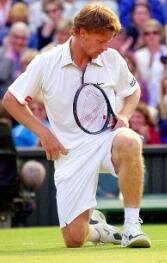 hours 22 minutes, having just one break point in the entire match! When Mark Philippoussis won the longest fifth set at Wimbledon in the Open era, he somehow summoned the strength to raise both arms in jubilation. An exhausted Philippoussis edged Sjeng Schalken 4-6, 6-3, 6-7(7), 7-6(4), 20-18 on Court No. 2! “I feel I’ve just been punched to death for five hours,” said Philippoussis, whose right elbow was bloodied when he dove for a shot midway through the final set. “A match like that, it’s tough for someone to lose.” It could be exceptionally tough for Schalken, who third straight year lost fifth set at Wimbledon with a two-game difference, each year playing longer (6-8 vs. Gambill, 11-13 vs. Courier, 18-20 vs. Scud). The third-round marathon took 5 hours, 1 minute. That was eleven minutes shy of the Open era record at Wimbledon, set when Pancho Gonzalez beat Charlie Pasarell 22-24, 1-6, 16-14, 6-3, 11-9 in the first round in 1969 over two days. When Scud’s next opponent – Henman – took the court, Philippoussis and Schalken had just started their fifth set. When he finished, they were still playing. “I said to Philippoussis, ‘What took you so long? I played my match to one set of yours,'” Henman joked. The final set between Philippoussis and Schalken lasted 2 hours, 15 minutes. The 83 games they played were the most in a match at Wimbledon since 1970, before the tiebreaker was introduced. Since the Open era began in 1968, the previous longest fifth set came in Paul McNamee‘s 6-3, 6-4, 2-6, 1-6, 19-17 victory over Todd Nelson in the opening round in 1987. Philippoussis managed the only break of the final set came in the 37th game. He belted a forehand for a winner to take a 30/0 lead, then slammed another forehand winner at 40/0 to win the game (before it happened, the Australian had had to serve 14 times to stay in the match winning 10 of those games quite easily). A partisan crowd on Court 2 cheered lustily for the 10th-seeded Australian. He then hit four service winners in the next game to close out the victory. Philippoussis finished with 44 aces (Schalken struck 30 – according to the ATP website there were 38 & 26 aces respectively). “I’m a little disappointed,” he joked referring to his ’95 Kuala Lumpur match against Byron Black. “I once hit 44 in three sets. That was my record, so I’m a little disappointed with 44.” Twenty of his aces came in the last set, and lost his serve just twice in the entire match (Schalken had four break points). Schalken was broken only three times, including in the pivotal next-to-last game. “Before I took a shower, I was very mad,” Schalken said. “I’m better now. I did everything I could. I could do no more.” The unseeded
hours 22 minutes, having just one break point in the entire match! When Mark Philippoussis won the longest fifth set at Wimbledon in the Open era, he somehow summoned the strength to raise both arms in jubilation. An exhausted Philippoussis edged Sjeng Schalken 4-6, 6-3, 6-7(7), 7-6(4), 20-18 on Court No. 2! “I feel I’ve just been punched to death for five hours,” said Philippoussis, whose right elbow was bloodied when he dove for a shot midway through the final set. “A match like that, it’s tough for someone to lose.” It could be exceptionally tough for Schalken, who third straight year lost fifth set at Wimbledon with a two-game difference, each year playing longer (6-8 vs. Gambill, 11-13 vs. Courier, 18-20 vs. Scud). The third-round marathon took 5 hours, 1 minute. That was eleven minutes shy of the Open era record at Wimbledon, set when Pancho Gonzalez beat Charlie Pasarell 22-24, 1-6, 16-14, 6-3, 11-9 in the first round in 1969 over two days. When Scud’s next opponent – Henman – took the court, Philippoussis and Schalken had just started their fifth set. When he finished, they were still playing. “I said to Philippoussis, ‘What took you so long? I played my match to one set of yours,'” Henman joked. The final set between Philippoussis and Schalken lasted 2 hours, 15 minutes. The 83 games they played were the most in a match at Wimbledon since 1970, before the tiebreaker was introduced. Since the Open era began in 1968, the previous longest fifth set came in Paul McNamee‘s 6-3, 6-4, 2-6, 1-6, 19-17 victory over Todd Nelson in the opening round in 1987. Philippoussis managed the only break of the final set came in the 37th game. He belted a forehand for a winner to take a 30/0 lead, then slammed another forehand winner at 40/0 to win the game (before it happened, the Australian had had to serve 14 times to stay in the match winning 10 of those games quite easily). A partisan crowd on Court 2 cheered lustily for the 10th-seeded Australian. He then hit four service winners in the next game to close out the victory. Philippoussis finished with 44 aces (Schalken struck 30 – according to the ATP website there were 38 & 26 aces respectively). “I’m a little disappointed,” he joked referring to his ’95 Kuala Lumpur match against Byron Black. “I once hit 44 in three sets. That was my record, so I’m a little disappointed with 44.” Twenty of his aces came in the last set, and lost his serve just twice in the entire match (Schalken had four break points). Schalken was broken only three times, including in the pivotal next-to-last game. “Before I took a shower, I was very mad,” Schalken said. “I’m better now. I did everything I could. I could do no more.” The unseeded 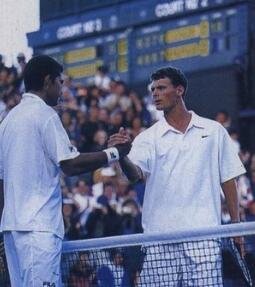 Dutchman was eliminated by Jim Courier in the third round last year, losing 13-11 in the fifth set, then being eight times ahead in the marathon deciding set. “I think Wimbledon doesn’t want to have me in the fourth round,” Schalken said with a weary smile. He had an advantage serving first in the final set, which meant Philippoussis was always behind when serving. Schalken erased a break point at 8:8, passing Philippoussis with a running crosscourt backhand from 10 feet behind the baseline. Philippoussis dove for the ball in vain and scraped his right elbow, and blood trickled down his arm for several games. When the match reached the four-hour mark at 11:11, Schalken took a bathroom break. At 13:14, Philippoussis fell behind 0/30, then got lucky. He mis-hit a half-volley, but the ball barely cleared the net for a winner. “I jumped up just to help it go over,” Philippoussis joked. He then hit a second serve that landed on the sideline for an ace, and went on to win the game. “I’ve always considered myself a fighter,” Philippoussis said. “That was a good match for me just to hang in there. I very much enjoyed that match.” In other long fifth set duel, Marc Rosset dispatched Tommy Haas in 3 hours 22 minutes, 6-4, 3-6, 6-3, 3-6, 9-7 serving in “Enqvist style”: 21 aces, 18 double faults. One break decided each set, in the final set it was the 16th and the last game when Rosset managed to get three straight points with brilliant passing-shots (two backhands and forehand on first match point).
Dutchman was eliminated by Jim Courier in the third round last year, losing 13-11 in the fifth set, then being eight times ahead in the marathon deciding set. “I think Wimbledon doesn’t want to have me in the fourth round,” Schalken said with a weary smile. He had an advantage serving first in the final set, which meant Philippoussis was always behind when serving. Schalken erased a break point at 8:8, passing Philippoussis with a running crosscourt backhand from 10 feet behind the baseline. Philippoussis dove for the ball in vain and scraped his right elbow, and blood trickled down his arm for several games. When the match reached the four-hour mark at 11:11, Schalken took a bathroom break. At 13:14, Philippoussis fell behind 0/30, then got lucky. He mis-hit a half-volley, but the ball barely cleared the net for a winner. “I jumped up just to help it go over,” Philippoussis joked. He then hit a second serve that landed on the sideline for an ace, and went on to win the game. “I’ve always considered myself a fighter,” Philippoussis said. “That was a good match for me just to hang in there. I very much enjoyed that match.” In other long fifth set duel, Marc Rosset dispatched Tommy Haas in 3 hours 22 minutes, 6-4, 3-6, 6-3, 3-6, 9-7 serving in “Enqvist style”: 21 aces, 18 double faults. One break decided each set, in the final set it was the 16th and the last game when Rosset managed to get three straight points with brilliant passing-shots (two backhands and forehand on first match point).
Fourth round: (CNN)
Byron Black [52] reached his first Grand Slam quarterfinal since 1995 by beating 35-year-old Gianluca Pozzi 4-6, 7-6(5), 6-2, 6-4. Pozzi [64], the 35-year old Italian who was virtually blown off court by Rusedski at Nottingham little more than a year ago, playing 14th year on tour, reached the last 16 of a major event just for the second time in career (after US Open ’94) with a 4-set  dismissal of Olivier Rochus – a meeting between the oldest and the youngest (Rochus 19 y.o. at the time) players in the tournament. The Italian said: “I sometimes play with Byron when we have time. We play sometimes between the tournaments.” Age doesn’t bother Pozzi and he added: “I think 28, 30 is your best time. But there are a lot of other athletes in different sports older than 30. Michael Johnson is one year younger than me. I don’t feel the age. At the moment I’m as fit as I’ve ever been. I’m serving better. I think I’m improving every year.” Pozzi thanks to the fourth round at Wimbledon reached his highest position in the ATP ranking – 46th. Six months later he improved hi career-best by advancing six places higher. Pete Sampras sent an ominous message to Wimbledon pretenders Monday that sore foot or not, he intends to secure a seventh title in eight years. The 28-year-old top seed blasted his way into the quarterfinals, beating Jonas Bjorkman of Sweden 6-3, 6-2, 7-5 and showing no sign of the injury that threatened his title defense last week. “I felt better about the way I played today,” Sampras said. “My energy was a lot better… it was nice to go out with a good attitude today.” Dark-horses Vladimir Voltchkov of Belarus and Alexander Popp of Germany advanced. Voltchkov, a qualifier ranked No. 237, beat Wayne Ferreira 6-3, 6-4, 7-6(0) – the South African broke two racquets. In a match-up of two 6-foot-7 players, Popp defeated Marc Rosset 6-1, 6-4, 3-6, 4-6, 6-1. In this exceptionally short 5-setter (2 hours 25 minutes), the German served just 8 aces, but the last two came in the last two points of the match. After the tournament he advanced to his career-high 74th place. [ He remains to this day some kind of mystery as a grass-court specialist deprived of powerful serve (which someone would assume taking into account his height): two-time Wimbledon quarter-finalist (second time in 2003), finalist in Newport ’04 and lack of other valuable ATP results ]… Popp will next play No. 12 Patrick Rafter, who beat Thomas Johansson 6-3, 6-4, 6-7(4), 6-1. Rafter, out for five months after shoulder surgery late last year, looked by far the more competent player against Johansson, who stormed up and down the baseline muttering to himself every time he hit a ball out of court. The pony-tailed Australian lost his rhythm slightly in the 1st set after a rain delay, allowing Johansson to claw his way up from *0:5 but then rained down aces to take the set 6-3. Both men played stunning tennis in the 2nd set, wrong-footing each other and chasing down every single ball. But Rafter proved his athletic prowess, out-hitting the Swede and rushing towards a quick win. Johansson rallied in the 3rd set, defending six break points and taking the tie break with a stinging backhand return. But the Swede’s luck ran out there as Rafter powered his way through the final set, serving one unreturnable serve after another and dominating rallies from the baseline and at the net. Tim Henman, who had courageously and often brilliantly survived a breathtaking first set onslaught by Mark Philippoussis well enough to inspire the belief that his Wimbledon crusade would continue,
dismissal of Olivier Rochus – a meeting between the oldest and the youngest (Rochus 19 y.o. at the time) players in the tournament. The Italian said: “I sometimes play with Byron when we have time. We play sometimes between the tournaments.” Age doesn’t bother Pozzi and he added: “I think 28, 30 is your best time. But there are a lot of other athletes in different sports older than 30. Michael Johnson is one year younger than me. I don’t feel the age. At the moment I’m as fit as I’ve ever been. I’m serving better. I think I’m improving every year.” Pozzi thanks to the fourth round at Wimbledon reached his highest position in the ATP ranking – 46th. Six months later he improved hi career-best by advancing six places higher. Pete Sampras sent an ominous message to Wimbledon pretenders Monday that sore foot or not, he intends to secure a seventh title in eight years. The 28-year-old top seed blasted his way into the quarterfinals, beating Jonas Bjorkman of Sweden 6-3, 6-2, 7-5 and showing no sign of the injury that threatened his title defense last week. “I felt better about the way I played today,” Sampras said. “My energy was a lot better… it was nice to go out with a good attitude today.” Dark-horses Vladimir Voltchkov of Belarus and Alexander Popp of Germany advanced. Voltchkov, a qualifier ranked No. 237, beat Wayne Ferreira 6-3, 6-4, 7-6(0) – the South African broke two racquets. In a match-up of two 6-foot-7 players, Popp defeated Marc Rosset 6-1, 6-4, 3-6, 4-6, 6-1. In this exceptionally short 5-setter (2 hours 25 minutes), the German served just 8 aces, but the last two came in the last two points of the match. After the tournament he advanced to his career-high 74th place. [ He remains to this day some kind of mystery as a grass-court specialist deprived of powerful serve (which someone would assume taking into account his height): two-time Wimbledon quarter-finalist (second time in 2003), finalist in Newport ’04 and lack of other valuable ATP results ]… Popp will next play No. 12 Patrick Rafter, who beat Thomas Johansson 6-3, 6-4, 6-7(4), 6-1. Rafter, out for five months after shoulder surgery late last year, looked by far the more competent player against Johansson, who stormed up and down the baseline muttering to himself every time he hit a ball out of court. The pony-tailed Australian lost his rhythm slightly in the 1st set after a rain delay, allowing Johansson to claw his way up from *0:5 but then rained down aces to take the set 6-3. Both men played stunning tennis in the 2nd set, wrong-footing each other and chasing down every single ball. But Rafter proved his athletic prowess, out-hitting the Swede and rushing towards a quick win. Johansson rallied in the 3rd set, defending six break points and taking the tie break with a stinging backhand return. But the Swede’s luck ran out there as Rafter powered his way through the final set, serving one unreturnable serve after another and dominating rallies from the baseline and at the net. Tim Henman, who had courageously and often brilliantly survived a breathtaking first set onslaught by Mark Philippoussis well enough to inspire the belief that his Wimbledon crusade would continue, 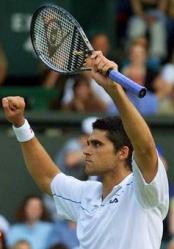 then had his hopes blown away by the Australian’s awesome serving power on the Centre Court last night. After the last of Philippoussis’ 34 aces had screamed past him – a second serve at that – Henman slammed his racket on the sole of his left foot and it crumpled, just like his aspirations. Tenth seed Philippoussis, who had survived a five-set, five-hour marathon against Schalken in the last round, took 3 hours 12 minutes to defeat the eighth seed 6-1, 5-7, 6-7(9), 6-3, 6-4. “On his day he is capable of beating anyone,” said Henman. Any British hopes that Philippoussis had been drained by Saturday’s marathon were shattered. “You have got to give him credit for his guts and determination,” Henman said. “I gave it everything I’ve got. I have played a lot worse and won.” Philippoussis, who had to withdrew with a knee injury when leading top seed Sampras in last year’s quarterfinals, slaughtered Henman in a one-sided first set. The disconsolate Brit got just five points in the first five games – and two of those were Philippoussis double faults. Henman, lifted by a patriotic crowd on Centre Court, broke for a 3:1 lead in the 2nd set. But Philippoussis, who had beaten Henman in their last three encounters, broke right back. Henman broke again in the crucial 12th game, winning a standing ovation from the flag-waving crowd. In the 3rd set Henman needed seven set points to finally win it 11/9 in the tie-break. The 4th and 5th sets were slugfests where powerful first serves won the day. Henman could not compete against the towering Australian. A break of serve in each set was enough to give the Australian victory (decisive break in 7th game of the final set) and Philippoussis, closed out the match in majestic style with four aces in his last service game – 215, 228, 205 & 193 respectively in kph (the last one on second serve)! Henman left the tournament he loves on a determinedly upbeat note: “I’ll be back for many more years and I will do everything in my power to make it happen.” Andre Agassi breezed into the Wimbledon quarterfinals on Monday, taking just 1 hour 44 minutes to overcome German
then had his hopes blown away by the Australian’s awesome serving power on the Centre Court last night. After the last of Philippoussis’ 34 aces had screamed past him – a second serve at that – Henman slammed his racket on the sole of his left foot and it crumpled, just like his aspirations. Tenth seed Philippoussis, who had survived a five-set, five-hour marathon against Schalken in the last round, took 3 hours 12 minutes to defeat the eighth seed 6-1, 5-7, 6-7(9), 6-3, 6-4. “On his day he is capable of beating anyone,” said Henman. Any British hopes that Philippoussis had been drained by Saturday’s marathon were shattered. “You have got to give him credit for his guts and determination,” Henman said. “I gave it everything I’ve got. I have played a lot worse and won.” Philippoussis, who had to withdrew with a knee injury when leading top seed Sampras in last year’s quarterfinals, slaughtered Henman in a one-sided first set. The disconsolate Brit got just five points in the first five games – and two of those were Philippoussis double faults. Henman, lifted by a patriotic crowd on Centre Court, broke for a 3:1 lead in the 2nd set. But Philippoussis, who had beaten Henman in their last three encounters, broke right back. Henman broke again in the crucial 12th game, winning a standing ovation from the flag-waving crowd. In the 3rd set Henman needed seven set points to finally win it 11/9 in the tie-break. The 4th and 5th sets were slugfests where powerful first serves won the day. Henman could not compete against the towering Australian. A break of serve in each set was enough to give the Australian victory (decisive break in 7th game of the final set) and Philippoussis, closed out the match in majestic style with four aces in his last service game – 215, 228, 205 & 193 respectively in kph (the last one on second serve)! Henman left the tournament he loves on a determinedly upbeat note: “I’ll be back for many more years and I will do everything in my power to make it happen.” Andre Agassi breezed into the Wimbledon quarterfinals on Monday, taking just 1 hour 44 minutes to overcome German 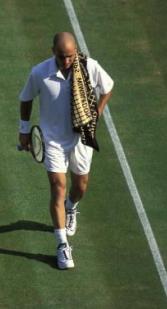 qualifier David Prinosil 6-4, 6-3, 6-3. The former champion and second seed looked relaxed in the early evening sun on court one as he out-gunned Prinosil with a swinging serve and ferocious ground-strokes. An increasingly frustrated Prinosil put all he had into his serves to try to neutralize Agassi’s famous returns, but succeeded only in producing double faults on key points. Jan-Michael Gambill was too numb from his victory today to let the reality of playing Sampras in the quarterfinals on Wednesday crash his feel-good moment. For years, Gambill has played under the burden to be the next great American player. Early this evening, he levitated above the Wimbledon grass after serving 33 aces and upsetting ninth-seeded Thomas Enqvist, 7-6(5), 3-6, 6-3, 6-4. “I’d say I’m one of the luckiest people on earth,” said the 56th-ranked Gambill, 23, who makes his home in Colbert, ”I get to go out there in the quarterfinals of Wimbledon and play on Center Court, play Sampras, the king of Wimbledon, the best player to ever play the game. ‘I’m just going to go out there and have a lot of fun. I’m going to play great tennis. It’s something to look forward to.”
qualifier David Prinosil 6-4, 6-3, 6-3. The former champion and second seed looked relaxed in the early evening sun on court one as he out-gunned Prinosil with a swinging serve and ferocious ground-strokes. An increasingly frustrated Prinosil put all he had into his serves to try to neutralize Agassi’s famous returns, but succeeded only in producing double faults on key points. Jan-Michael Gambill was too numb from his victory today to let the reality of playing Sampras in the quarterfinals on Wednesday crash his feel-good moment. For years, Gambill has played under the burden to be the next great American player. Early this evening, he levitated above the Wimbledon grass after serving 33 aces and upsetting ninth-seeded Thomas Enqvist, 7-6(5), 3-6, 6-3, 6-4. “I’d say I’m one of the luckiest people on earth,” said the 56th-ranked Gambill, 23, who makes his home in Colbert, ”I get to go out there in the quarterfinals of Wimbledon and play on Center Court, play Sampras, the king of Wimbledon, the best player to ever play the game. ‘I’m just going to go out there and have a lot of fun. I’m going to play great tennis. It’s something to look forward to.”
Quarterfinals: Bill Barclay
Pete Sampras moved to within two wins of a record 13th Grand Slam title when he defeated fellow American Jan-Michael Gambill 6-4, 6-7(4), 6-4, 6-4 in the Wimbledon quarterfinals on Wednesday. A single break in each of the three sets he won, secured Sampras victory and the 28-year-old showed no sign of the tendinitis in his shin that hindered him last week. In fact it was Gambill who struggled with injury, first needing a thigh support and then a plaster for a bleeding nipple. The younger American started tentatively, failing to follow up his serve, and at 4:5 he double-faulted disastrously to gift Sampras the set. Both players saved break points in the 2nd (Gambill also a set point at *4:5 in the 2nd set) before a wristy backhand pass secured Gambill the vital mini-break in the tie-break, which he took with two service winners in the end. Sampras looked sluggish under the heavy skies on Centre Court and seemed content to do the bare minimum required to progress. Twice Sampras had saved break points at 2:3 in the 3rd set before Gambill again cracked under pressure, carelessly putting a forehand out when serving at 4-all to concede the vital break in the third set. It was a similar story in the 4th set. But this time Sampras visibly stepped 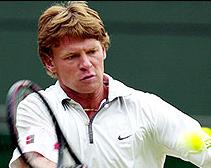 up a gear at 4:4, producing an exquisite stop volley and then a forehand pass to break the otherwise impressive Gambill serve. Typically the defending champion produced an ace on his first match point – his 26th ace of the match (Gambill hit 23) – to end Gambill’s brave effort after 2 hours 46 minutes. Vladimir Voltchkov is following in John McEnroe‘s footsteps. The 22-year-old from Belarus beat Zimbabwe’s unseeded Byron Black 7-6(2), 7-6(2), 6-4 on Wednesday to become the first qualifier since McEnroe in 1977 to reach the semifinals at Wimbledon. Ranked only 237th, Voltchkov had no chance of joining most of the other players as they warmed up for Wimbledon by playing tournaments in Halle or Queens Club. Instead, he got there by preparing on synthetic grass. That’s all there is back home in Belarus, where he learned to play on a court set up for workers at a car factory. “We’re practicing on synthetic grass there,” said Voltchkov, who was taken to the factory and introduced to tennis by his father, Nicolai. “It is different, but there’s nothing to choose from. We have those courts, and that’s where I get ready for the natural grass.” McEnroe is not the only legend that Voltchkov is trying to copy. No former Wimbledon junior champion – Voltchkov won in 1996 – has progressed as far since Stefan Edberg in 1987. Despite a modest career, Voltchkov hasn’t been overwhelmed by the storied All England Club. He has never been in the semifinals of any ATP Tour event. In fact, he’s only played 11 ATP tournaments, spending most of his time on the Challenger circuit. Until Wimbledon this year, Voltchkov had played just 36 matches in his career, more than half of those in Davis Cup. 13 of his 16 career singles victories entering Wimbledon came in Davis Cup competition. Voltchkov was almost eliminated in the second qualifying round when he beat seeded No. 1 Antony Dupuis 6-1, 6-7(2), 8-6… Second seed Andre Agassi powered past Mark Philippoussis 7-6(4), 6-3, 6-4 to reach the Wimbledon semifinals on Wednesday, and said his game has come right at just the right time: “I was somewhat against the wall coming into this event just because I hadn’t had the matches I wanted. But I said all along if I can get through the first week I can start bringing out different parts of my game on this court.” Agassi will play Australian 12th seed Pat Rafter for a place in
up a gear at 4:4, producing an exquisite stop volley and then a forehand pass to break the otherwise impressive Gambill serve. Typically the defending champion produced an ace on his first match point – his 26th ace of the match (Gambill hit 23) – to end Gambill’s brave effort after 2 hours 46 minutes. Vladimir Voltchkov is following in John McEnroe‘s footsteps. The 22-year-old from Belarus beat Zimbabwe’s unseeded Byron Black 7-6(2), 7-6(2), 6-4 on Wednesday to become the first qualifier since McEnroe in 1977 to reach the semifinals at Wimbledon. Ranked only 237th, Voltchkov had no chance of joining most of the other players as they warmed up for Wimbledon by playing tournaments in Halle or Queens Club. Instead, he got there by preparing on synthetic grass. That’s all there is back home in Belarus, where he learned to play on a court set up for workers at a car factory. “We’re practicing on synthetic grass there,” said Voltchkov, who was taken to the factory and introduced to tennis by his father, Nicolai. “It is different, but there’s nothing to choose from. We have those courts, and that’s where I get ready for the natural grass.” McEnroe is not the only legend that Voltchkov is trying to copy. No former Wimbledon junior champion – Voltchkov won in 1996 – has progressed as far since Stefan Edberg in 1987. Despite a modest career, Voltchkov hasn’t been overwhelmed by the storied All England Club. He has never been in the semifinals of any ATP Tour event. In fact, he’s only played 11 ATP tournaments, spending most of his time on the Challenger circuit. Until Wimbledon this year, Voltchkov had played just 36 matches in his career, more than half of those in Davis Cup. 13 of his 16 career singles victories entering Wimbledon came in Davis Cup competition. Voltchkov was almost eliminated in the second qualifying round when he beat seeded No. 1 Antony Dupuis 6-1, 6-7(2), 8-6… Second seed Andre Agassi powered past Mark Philippoussis 7-6(4), 6-3, 6-4 to reach the Wimbledon semifinals on Wednesday, and said his game has come right at just the right time: “I was somewhat against the wall coming into this event just because I hadn’t had the matches I wanted. But I said all along if I can get through the first week I can start bringing out different parts of my game on this court.” Agassi will play Australian 12th seed Pat Rafter for a place in 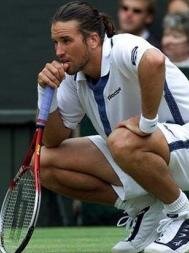 Sunday’s final after Rafter beat German Alexander Popp 6-3, 6-2, 7-6(1) on Court One. In the opening two sets Popp was visibly abashed playing for the first time in life in front of a large audience. After winning the first two sets in 56 minutes and serving for the match in the 3rd leading 5:4, Rafter was broken. The 23-year-old Popp, one of 25 men to make their Wimbledon debut this season, played his first Grand Slam last month at Roland Garros, losing in the first round to eventual semifinalist Franco Squillari 3-6, 6-3, 6-2, 6-0. Agassi beat Rafter in last year’s semifinals before losing the final to Sampras. Agassi absorbed everything huge-serving Philippoussis threw at him and the 1992 champion snatched the 1st set on a tie-break after 50 minutes with his first ace. He secured the first break of the match in the 8th game of the 2nd set when Philippoussis, whose last two matches had gone to five sets, double-faulted. He broke again for 2:1 in the 3rd as the Australian was forced into going for more and more power on his serve in the face of excellent returning. That break was all Agassi needed as he closed out the match on his own serve after 1 hour 58 minutes. “Obviously just one or two points cost me that opening set and it would have been nice to get that set because Andre is such a great front-runner,” Philippoussis said afterwards. “I was feeling good… can’t have any complaints. Against a player like Andre you’ve got to take your chances. I can hold my head up high – I’ve nothing to be ashamed of.” Indeed, Philippoussis was serving as good as in the previous matches (22 aces this time), but couldn’t convert of his five break point chances. Agassi said: “He has a great serve game… one of the best in the sport. I think Mark will have his day – he’s a powerful figure out there who can have great tournaments against the best of us.” Three years later, Philippoussis defeated Agassi in the Wimbledon fourth round when they faced each other for the last time (H2H – Agassi 6:2).
Sunday’s final after Rafter beat German Alexander Popp 6-3, 6-2, 7-6(1) on Court One. In the opening two sets Popp was visibly abashed playing for the first time in life in front of a large audience. After winning the first two sets in 56 minutes and serving for the match in the 3rd leading 5:4, Rafter was broken. The 23-year-old Popp, one of 25 men to make their Wimbledon debut this season, played his first Grand Slam last month at Roland Garros, losing in the first round to eventual semifinalist Franco Squillari 3-6, 6-3, 6-2, 6-0. Agassi beat Rafter in last year’s semifinals before losing the final to Sampras. Agassi absorbed everything huge-serving Philippoussis threw at him and the 1992 champion snatched the 1st set on a tie-break after 50 minutes with his first ace. He secured the first break of the match in the 8th game of the 2nd set when Philippoussis, whose last two matches had gone to five sets, double-faulted. He broke again for 2:1 in the 3rd as the Australian was forced into going for more and more power on his serve in the face of excellent returning. That break was all Agassi needed as he closed out the match on his own serve after 1 hour 58 minutes. “Obviously just one or two points cost me that opening set and it would have been nice to get that set because Andre is such a great front-runner,” Philippoussis said afterwards. “I was feeling good… can’t have any complaints. Against a player like Andre you’ve got to take your chances. I can hold my head up high – I’ve nothing to be ashamed of.” Indeed, Philippoussis was serving as good as in the previous matches (22 aces this time), but couldn’t convert of his five break point chances. Agassi said: “He has a great serve game… one of the best in the sport. I think Mark will have his day – he’s a powerful figure out there who can have great tournaments against the best of us.” Three years later, Philippoussis defeated Agassi in the Wimbledon fourth round when they faced each other for the last time (H2H – Agassi 6:2).
Semifinals: (CNN)
Patrick Rafter overcame the blistering returns and passing shots of Andre Agassi to win in five sets Friday and become the first Australian to reach the men’s final at Wimbledon in 13 years. Rafter played a masterful grass-court match, mixing his acrobatic serve-and-volley game with off-speed 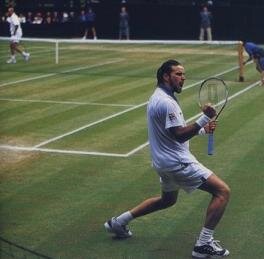 shots to dismantle Agassi 7-5, 4-6, 7-5, 4-6, 6-3 in 3 hours, 18 minutes. Rafter is the first Aussie in the Wimbledon final since Pat Cash, who won the title in 1987. In Sunday’s championship match, he’ll meet six-time champion Pete Sampras, who defeated qualifier Vladimir Voltchkov 7-6(4), 6-2, 6-4 in 1 hour, 39 minutes. Rafter’s victory marked a dramatic return from the shoulder surgery in October which kept him out of the game for five months. Earlier this year, he suggested he was considering retirement. Friday’s match was a repeat of last year’s semifinal, won by Agassi in straight sets. The high-quality match provided a classic contrast between Agassi, the consummate returner and counter-puncher, and Rafter, the serve-and-volley specialist. Rafter chipped and charged on Agassi’s second serves. In baseline rallies, he relied on a soft, slice backhand to rob Agassi of the pace on which he thrives. In the end, it was Agassi’s serve which let him down. He served eight double faults, several at crucial moments. Agassi’s final double came in the 6th game of the 5th set, with Rafter converting the decisive break on the next point to go up 4:2. From that game, a deflated Agassi lost the last 15 points of the match. The 12th-seeded Rafter served 18 aces and had 7 double faults. He roamed all over the court, knocking off 35 volley winners. The second-seeded Agassi, who won Wimbledon in 1992 by staying at the baseline, played the same way against Rafter. He cracked 18 passing shot winners and moved in on returns to keep pressure on Rafter’s serve. But Rafter’s superior serve and more varied game proved the difference. “I thought I was going to struggle out there today,” Rafter said. “I came out and I played some really good stuff on Andre’s serve and put him under pressure. I started serving well in the fifth. Everything started coming together when I needed it to.” Agassi offered no excuses. “I was always behind,” he said. “He stepped it up and played enough quality shots at the right time. He played a great fifth set… I didn’t serve as well as I wanted to do today and made some careless errors. To his credit he played well at the right time.” Hypothetically Rafter could win in straight sets, but squandered a double mini-set point leading 4:3* (40/15) in the 2nd set. The Australian was 13-3 (!) in five-setters after that semifinal. Sampras extended
shots to dismantle Agassi 7-5, 4-6, 7-5, 4-6, 6-3 in 3 hours, 18 minutes. Rafter is the first Aussie in the Wimbledon final since Pat Cash, who won the title in 1987. In Sunday’s championship match, he’ll meet six-time champion Pete Sampras, who defeated qualifier Vladimir Voltchkov 7-6(4), 6-2, 6-4 in 1 hour, 39 minutes. Rafter’s victory marked a dramatic return from the shoulder surgery in October which kept him out of the game for five months. Earlier this year, he suggested he was considering retirement. Friday’s match was a repeat of last year’s semifinal, won by Agassi in straight sets. The high-quality match provided a classic contrast between Agassi, the consummate returner and counter-puncher, and Rafter, the serve-and-volley specialist. Rafter chipped and charged on Agassi’s second serves. In baseline rallies, he relied on a soft, slice backhand to rob Agassi of the pace on which he thrives. In the end, it was Agassi’s serve which let him down. He served eight double faults, several at crucial moments. Agassi’s final double came in the 6th game of the 5th set, with Rafter converting the decisive break on the next point to go up 4:2. From that game, a deflated Agassi lost the last 15 points of the match. The 12th-seeded Rafter served 18 aces and had 7 double faults. He roamed all over the court, knocking off 35 volley winners. The second-seeded Agassi, who won Wimbledon in 1992 by staying at the baseline, played the same way against Rafter. He cracked 18 passing shot winners and moved in on returns to keep pressure on Rafter’s serve. But Rafter’s superior serve and more varied game proved the difference. “I thought I was going to struggle out there today,” Rafter said. “I came out and I played some really good stuff on Andre’s serve and put him under pressure. I started serving well in the fifth. Everything started coming together when I needed it to.” Agassi offered no excuses. “I was always behind,” he said. “He stepped it up and played enough quality shots at the right time. He played a great fifth set… I didn’t serve as well as I wanted to do today and made some careless errors. To his credit he played well at the right time.” Hypothetically Rafter could win in straight sets, but squandered a double mini-set point leading 4:3* (40/15) in the 2nd set. The Australian was 13-3 (!) in five-setters after that semifinal. Sampras extended  his Wimbledon winning streak to 27 matches and ran his record to 52-1 over seven years. He can equal William Renshaw‘s record of seven Wimbledon singles titles and surpass Roy Emerson for sole possession of the career mark of Grand Slam wins with 13. “My legacy is really the last thing on my mind on Sunday,” Sampras said. “When you’re going through the battle, you can’t think of your place in history. It’s the match at hand.” “I tried to fight, but he was just too good,” Voltchkov said. “I mean, I didn’t have one chance on his serve.” Voltchkov was still close, down 5:4 in the tie-break, when he missed a simple forehand volley. Stunned and puzzled by what he had just done, Voltchkov dropped his racket, crouched at the net and ran a hand through his hair. “In practice, you probably hit a hundred out of a hundred like that,” he said. “You miss one there. I guess it’s the nerves.” Sampras won the tie-break on the next point, and the match was essentially over. A trainer came out at 5:2* in the 2nd set to spray a numbing agent on Sampras’ ankle. While he appeared to favor the ankle on some points, on others Sampras ran full speed to smack winners.
his Wimbledon winning streak to 27 matches and ran his record to 52-1 over seven years. He can equal William Renshaw‘s record of seven Wimbledon singles titles and surpass Roy Emerson for sole possession of the career mark of Grand Slam wins with 13. “My legacy is really the last thing on my mind on Sunday,” Sampras said. “When you’re going through the battle, you can’t think of your place in history. It’s the match at hand.” “I tried to fight, but he was just too good,” Voltchkov said. “I mean, I didn’t have one chance on his serve.” Voltchkov was still close, down 5:4 in the tie-break, when he missed a simple forehand volley. Stunned and puzzled by what he had just done, Voltchkov dropped his racket, crouched at the net and ran a hand through his hair. “In practice, you probably hit a hundred out of a hundred like that,” he said. “You miss one there. I guess it’s the nerves.” Sampras won the tie-break on the next point, and the match was essentially over. A trainer came out at 5:2* in the 2nd set to spray a numbing agent on Sampras’ ankle. While he appeared to favor the ankle on some points, on others Sampras ran full speed to smack winners.
Final: (CNN)
Nothing was going to stop Pete Sampras from history on this fortnight, not the weather, the darkness, or the injury that had hampered him for nearly two weeks. Sampras overcame Patrick Rafter in four sets Sunday to win his seventh Wimbledon title and record-breaking 13th Grand 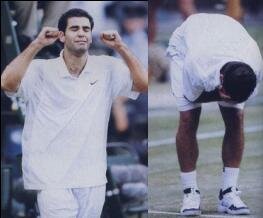 Slam championship. Sampras served 27 aces and whipped 13 passing shot winners to beat Rafter 6-7(10), 7-6(5), 6-4, 6-2 (2 hours, 58 minutes) in a rain-delayed match that ended at dusk. After Sampras hit a service winner on match point, he threw both arms in the air, then bent over, put his hands to his eyes, bit his lower lip and began to cry. Sampras climbed into the stands and hugged his tearful father, Sam, and mother, Gloria, who came to Wimbledon for the first time to watch him go for the record. Even tournament referee Alan Mills’ eyes brimmed with tears. The victory confirmed Sampras’ place as among the greatest players of all time – if not the greatest. The 28-year-old American matched the record of seven Wimbledon titles, set by William Renshaw in the 1880s, and surpassed the men’s record of 12 Grand Slam tournament victories he had shared with Australia’s Roy Emerson. Sampras has won 28 straight matches at Wimbledon, extending his mark there to 53-1 over the past eight years. “It meant so much to me,” he said. “My parents are here today. It’s so important to me they could share it with me. I love Wimbledon. This is the best court in the world. It’s my home away from home.” Sampras also is only the sixth player in history to win Wimbledon four straight years. The last to do it was Bjorn Borg, who won five straight from 1976-80. Sampras accomplished the feat despite tendinitis at the front of his left shin, which hobbled him most of the fortnight. In the end, he did it the way he always has – by out-serving his opponent. Firing first serves at an average speed of 123 mph, with a top delivery of 133 mph, Sampras was never broken Sunday, saving the only two break points against him. He
Slam championship. Sampras served 27 aces and whipped 13 passing shot winners to beat Rafter 6-7(10), 7-6(5), 6-4, 6-2 (2 hours, 58 minutes) in a rain-delayed match that ended at dusk. After Sampras hit a service winner on match point, he threw both arms in the air, then bent over, put his hands to his eyes, bit his lower lip and began to cry. Sampras climbed into the stands and hugged his tearful father, Sam, and mother, Gloria, who came to Wimbledon for the first time to watch him go for the record. Even tournament referee Alan Mills’ eyes brimmed with tears. The victory confirmed Sampras’ place as among the greatest players of all time – if not the greatest. The 28-year-old American matched the record of seven Wimbledon titles, set by William Renshaw in the 1880s, and surpassed the men’s record of 12 Grand Slam tournament victories he had shared with Australia’s Roy Emerson. Sampras has won 28 straight matches at Wimbledon, extending his mark there to 53-1 over the past eight years. “It meant so much to me,” he said. “My parents are here today. It’s so important to me they could share it with me. I love Wimbledon. This is the best court in the world. It’s my home away from home.” Sampras also is only the sixth player in history to win Wimbledon four straight years. The last to do it was Bjorn Borg, who won five straight from 1976-80. Sampras accomplished the feat despite tendinitis at the front of his left shin, which hobbled him most of the fortnight. In the end, he did it the way he always has – by out-serving his opponent. Firing first serves at an average speed of 123 mph, with a top delivery of 133 mph, Sampras was never broken Sunday, saving the only two break points against him. He  broke Rafter three times. In seven Wimbledon finals, Sampras has lost his serve only four times in 131 service games (twice to Courier ’93, twice to Ivanisevic ’98). But mixed in with all his aces and service winners Sunday, Sampras also had 12 double-faults, including several at crucial junctures that nearly cost him the match. Sampras hit two double-faults in the 1st-set tiebreaker, including one at 10:11 that gave Rafter the set (the Australian saved four break points at 4-all and two set points in the tie-break at 5:6 & 7:8). Sampras opened the 2nd tiebreaker with another double, his ninth of the match, and Rafter capitalized to go up 4:1. Then, suddenly, the match turned in Sampras’ favor as Rafter let him off the hook. A double-fault from Rafter brought Sampras back to 4-all as he ran off five straight points, punctuated by a searing inside-out forehand pass which he celebrated with an uppercut fist pump. Sampras ended the tiebreaker by wrong-footing Rafter with a forehand volley, clenching his fist again as he turned to his entourage in the stands. The first break of serve came after 2 hours, 11 minutes of play, when Rafter, who had saved nine break points until then, slapped an easy forehand volley into the net in the 5th game of the 3rd set. Rafter bounced his racket on the turf in anger. Sampras slammed his 24th ace to serve it out at love in the 10th game of the set to go up two sets to one. By then, it was nearly 8:30 p.m., but play continued into the 4th set. Sampras got a bit of luck when he broke again for a 3:2 lead, a mis-hit backhand flying over Rafter and landing on the baseline. In the next game, Sampras double-faulted again to give Rafter a break point and chance to stay in the match. Showing the grit that has dug him out of trouble so many times in his career, Sampras saved the break point with a
broke Rafter three times. In seven Wimbledon finals, Sampras has lost his serve only four times in 131 service games (twice to Courier ’93, twice to Ivanisevic ’98). But mixed in with all his aces and service winners Sunday, Sampras also had 12 double-faults, including several at crucial junctures that nearly cost him the match. Sampras hit two double-faults in the 1st-set tiebreaker, including one at 10:11 that gave Rafter the set (the Australian saved four break points at 4-all and two set points in the tie-break at 5:6 & 7:8). Sampras opened the 2nd tiebreaker with another double, his ninth of the match, and Rafter capitalized to go up 4:1. Then, suddenly, the match turned in Sampras’ favor as Rafter let him off the hook. A double-fault from Rafter brought Sampras back to 4-all as he ran off five straight points, punctuated by a searing inside-out forehand pass which he celebrated with an uppercut fist pump. Sampras ended the tiebreaker by wrong-footing Rafter with a forehand volley, clenching his fist again as he turned to his entourage in the stands. The first break of serve came after 2 hours, 11 minutes of play, when Rafter, who had saved nine break points until then, slapped an easy forehand volley into the net in the 5th game of the 3rd set. Rafter bounced his racket on the turf in anger. Sampras slammed his 24th ace to serve it out at love in the 10th game of the set to go up two sets to one. By then, it was nearly 8:30 p.m., but play continued into the 4th set. Sampras got a bit of luck when he broke again for a 3:2 lead, a mis-hit backhand flying over Rafter and landing on the baseline. In the next game, Sampras double-faulted again to give Rafter a break point and chance to stay in the match. Showing the grit that has dug him out of trouble so many times in his career, Sampras saved the break point with a 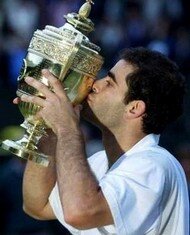 118 mph second-serve winner. Sampras held after four ‘deuces’ for 4:2 with his 27th ace. Rafter had nothing left, losing serve at 15 in the next game and watching almost helplessly in the final game as Sampras served out the match at love (three service winners). “This game is a matter of nerves,” Sampras said. “We were both feeling it. I felt it in the first tiebreaker. He felt in the second. The whole match just changed in a matter of minutes.” There were only a handful of baseline rallies in the whole match. The longest point came in the third game of the fourth set and had 13 shots, ending with Rafter hitting a forehand lob volley over Sampras’ shoulder. The match began an hour late because of rain and play was interrupted twice in the first set. There was a 2 1/2-hour interruption at 4:4, with Rafter serving at deuce. “The way the past week and a half has gone it’s the been the most difficult” of the seven titles to win, Sampras said, referring to his leg injury. “Obviously it’s a very emotional time for me. I want this event so bad.” Sampras received $720,000, Rafter $360,000. Sampras’ 63rd and next to last title. Stats of the final
118 mph second-serve winner. Sampras held after four ‘deuces’ for 4:2 with his 27th ace. Rafter had nothing left, losing serve at 15 in the next game and watching almost helplessly in the final game as Sampras served out the match at love (three service winners). “This game is a matter of nerves,” Sampras said. “We were both feeling it. I felt it in the first tiebreaker. He felt in the second. The whole match just changed in a matter of minutes.” There were only a handful of baseline rallies in the whole match. The longest point came in the third game of the fourth set and had 13 shots, ending with Rafter hitting a forehand lob volley over Sampras’ shoulder. The match began an hour late because of rain and play was interrupted twice in the first set. There was a 2 1/2-hour interruption at 4:4, with Rafter serving at deuce. “The way the past week and a half has gone it’s the been the most difficult” of the seven titles to win, Sampras said, referring to his leg injury. “Obviously it’s a very emotional time for me. I want this event so bad.” Sampras received $720,000, Rafter $360,000. Sampras’ 63rd and next to last title. Stats of the final
***********************************

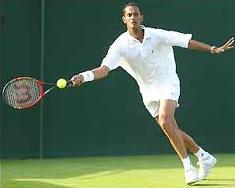
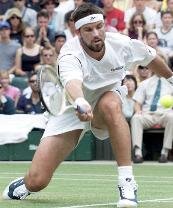
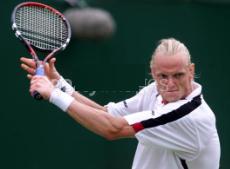
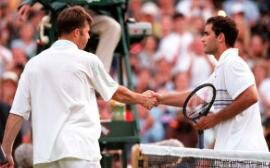
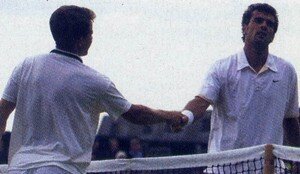
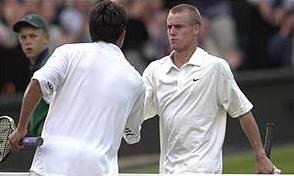

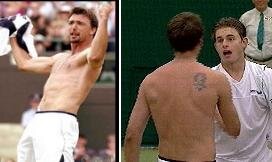
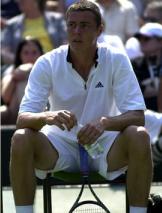

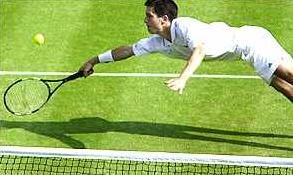

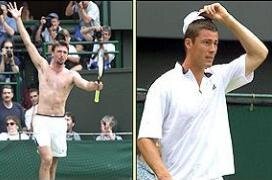
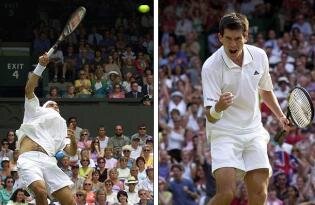
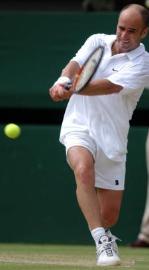


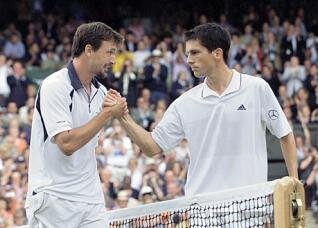
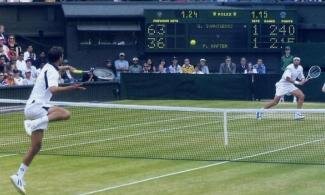
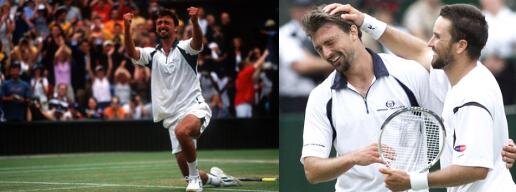

2000
Bjorkman/Rafter vs. Hewitt/Federer
Kafelnikov vs. Federer
Rafter vs. Agassi
Sampras vs. Rafter
2001
Rafter vs. Dosedel
Ivanisevic vs. Roddick
Federer vs. Sampras
Henman vs. Federer
Ivanisevic vs. Henman
Rafter vs. Agassi
Ivanisevic vs. Rafter
Number of Ivanisevic‘s aces in consecutive matches during tournaments he played in the Wimbledon finals:
206 aces in 1992 (17, 34, 22, 27, 33, 36, 37)
167 aces in 1994 (12, 18, 25, 36, 29, 22, 25)
184 aces in 1998 (17, 25, 42, 16, 24, 28, 32)
212 aces in 2001 (22, 34, 42, 22, 30, 35, 27)
In those 28 matches Ivanisevic was out-aced twice, in 1998 by T.Martin & Krajicek.
Other comparable achievement – Mark Philippoussis, who served 178 aces at Wimbledon in 2003 (21, 19, 33, 46, 34, 11 & 14)
Beside Ivanisevic & Philippoussis, John Isner is the third man to serve at least 30 aces in three matches in succession (Washington 2007)